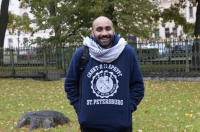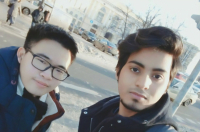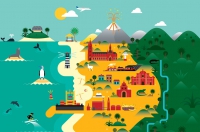Why did you decide to pursue your higher education in Russia?
I had several reasons for doing so. For starters, people in my home country think very highly of Russian education. I had learned Russian before and hoped that it would make it easier for me to study in Russia. Besides, education is much cheaper in Russia than in Guatemala, and I also get a scholarship here. Next year, I will finish my Master’s degree and go back home.
Why did you choose ITMO’s Cryogenic Technology Department for your Master’s?
After getting my Bachelor's degree, I started searching the Net for a place to continue my education. ITMO University is one of the leading Russian universities, so it’s no wonder that it caught my eye. What I liked the most was the department: until recently, there were no such departments in my home country, so I decided to stay in Russia for two more years.
You plan to launch your own business in Guatemala. What will it be about?
I plan to work in two directions, liquid nitrogen and cryosaunas. There is only one company working with liquid nitrogen in my home country, so many people have no idea about what it is and how it works. There is a niche in the market for this kind of product and I want to grab the chance. What is interesting is that in Russia a kilogram of liquid nitrogen costs 20 rub, while in Guatemala it costs about $7. Probably, that’s why this business is developing so slowly.

Liquid nitrogen can be used in medical laboratories for freezing and transporting food, preserving blood and seminal fluid, treating skin cancer and warts, and also in cryosaunas. Cryotherapy has a strong therapeutic effect on the human body, as it relieves pain and can be used to treat a variety of diseases, such as psoriasis, asthma, diabetes. Besides, this technology is actively used in cosmetology and in sports medicine to speed up the recovery after intense exercise, relieve pain, and accelerate the regeneration of injured tissue, so I think that my cryosaunas will be in demand.
Now you’re doing an internship at the Krion company. What tasks are you given there?
My scientific advisor is Professor Alexander Baranov, Head of ITMO’s Cryogenic Technology Department. When I learned about his interest in cryosaunas, I asked him to tell me about the equipment and how to work with it. This information will help me open my business faster when I get back home. That’s why I applied for an internship at Krion. The cryosaunas developed by Krion have already been tested during several big international competitions. What is more, the company plans to expand to the Latin American market, which is very beneficial for me, as I plan to buy Russian equipment for my business.

I want to write my thesis about a cryogenic micropump. I’m going to work on this project in Guatemala. So when I come home, I will have advanced knowledge of all the processes, and it will be easier for me to start working with these technologies.
Have you already decided what to start with?
It’s going to be a family business, as my mom wants to help me. My aunt is a lawyer and she will help us with all the paperwork. Then I will start purchasing equipment. I have found good equipment in Russia; it’s much cheaper than in the US, so I’m going to work with Russian suppliers. Unfortunately, they don’t teach you at the university how to get money for your business, but I’ll figure it out somehow; I’m going to invest my own money and attract investors.
Speaking of education, have you ever discussed the differences between Russian and Guatemalan education systems with your friends?
Yes, we do that from time to time. Personally, I really like the Russian education system, but I don't really understand how students are tested, mainly because of the language barrier. Although I’ve been living in Russia for five years now, I still can’t bring myself to learn a hundred theoretical questions.The Guatemalan education system is completely different: it’s test-based, and the examination questions focus on practice rather than theory. That makes exam preparation more difficult: you never know which questions you’ll be faced with.

For how long did you study Russian before moving here?
For eight months. These were preparatory courses that targeted the basics more suitable for tourists rather than people embarking on a tech degree. That’s why my Russian skills were insufficient for what I was doing, and the first months were really hard. Truth to be told, I’m still getting used to it; every new semester is a challenge. I understand the gist of the conversation, but don’t always get the details, which sometimes lead to miscommunications.
With university professors?
Mainly with them. During my five years in Russia I encountered different attitudes: from a desire to help to rebukes when I couldn’t express my thoughts clearly. When I first came to Russia the latter was a definite cultural shock. I would ask a question in English and get shouted at in Russian in response. Professors always say that if I came to Russia, I must speak Russian, not English.
Have you found any friends here in Russia?
I haven’t made any real, close friends among Russians, sadly. My boyfriend is in St. Petersburg, he’s studying at St. Petersburg Mining University. My brother’s studying economics in Tver. I also have friends from Peru, Columbia, and other countries, and we’ve all noticed that people in Russia don’t pay much attention to foreigners. For example, Russians rarely take the pains of introducing themselves first. Nevertheless, they pay a lot of attention to people who look different, and it’s not always well-meant. My brother and my boyfriend are black, and they often get comments from their fellow students. I can’t say this is true for everyone, but it happens. Back home, people never take issue with how others look and what the color of their skin is. Here this is a more problematic question; I feel it even when I’m waiting for a train in a metro station.




